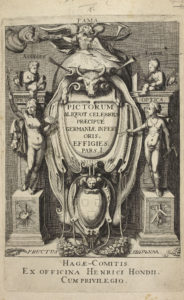
Titlepage To Part 1
Etching 22.7 x 14.8 cm Attributed to Simon Frisius Transcription and translation of texts: Over figure with trumpet in upper margin: FAMA: Fame On map below Fame: EUROPA: Europe Over putto sketching on left: ASSIDUUS: Diligent Over putto sketching on right: LABOR: Labour Over female figure on left with caduceus and palette: PICTURA: Painting Over… Continue Reading Titlepage To Part 1
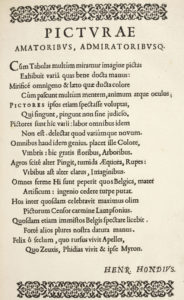
Poem to the Lovers and Admirers of Pictures
“Since we greatly admire pictures painted with varied images, which [pictures] the well-taught hand presents, and which, wonderfully drawn with every sort of joyful colour, greatly nourish the mind, the spirit and the eyes, it is also a pleasure to look at the PAINTERS themselves, who make and paint, not without discernment.” Continue Reading Poem to the Lovers and Admirers of Pictures
View →
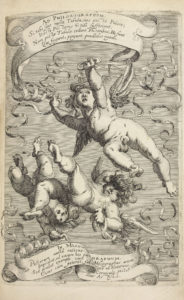
To the lover of things written and drawn
Etching and engraving 19.5 x 12.2 cm Transcription of text in banderole above flying putto: AD PHILOZOGRAPHUM. Si tibi sint nullae Tabulae, nec picta Poësis ; Docti Pictores hi tibi sufficiant. Nam pictae Tabulae cedunt Pictoribus. Hi sunt Qui fingunt, pingunt quodlibet ingenio. Translation of text in banderole above flying putto: To the lover… Continue Reading To the lover of things written and drawn
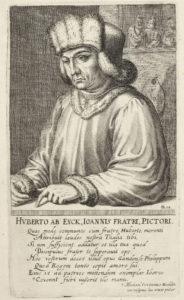
9. Hubert Van Eyck
“Hubert, if the praises which our Thalia recently attributed to you along with your deserving brother are not enough, let this [praise] of yours be added, that your brother, as your student, outdid you in ability. That work of yours in Ghent teaches this, which filled Philip with such love of it,4 that he ordered a copy of it to be made by the hand of Coxennius, to be sent to his native Spaniards.” Continue Reading 9. Hubert Van Eyck
View →
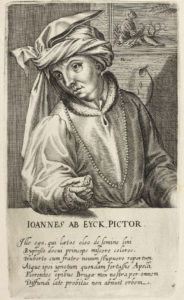
11. Jan Van Eyck
“I am he who first taught to mix joyful colours from the pressed oily seed of flax, with my brother Hubert. Bruges, flourishing with wealth, was astounded by this new discovery, perhaps unknown in the past to Apelles himself. Soon afterwards our uprightness did not refuse to be spread widely through the whole world.” Continue Reading 11. Jan Van Eyck
View →
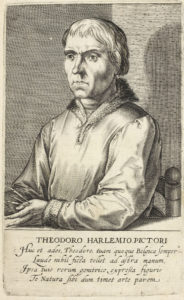
13. Dirck Bouts
You are here too, Theodore. Belgium shall always also raise your hand to the stars with no false praise, while Nature, expressed by your figures, fears you, equal to her in the art of begetting things. Continue Reading 13. Dirck Bouts
View →
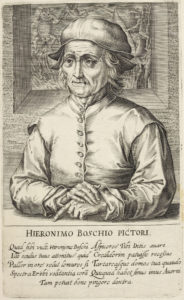
15. Hieronymus Bosch
What is meant by that astonished eye of yours, Hieronymus Bosch, or that pallor in your face? As if you had seen ghosts, the spectres of Erebus, flittering in front of you. I could believe that the caves of greedy Pluto and the houses of Tartarus lay open to you, seeing as your hand could paint so well whatever the lowest hollows of Avernus contain. Continue Reading 15. Hieronymus Bosch
View →
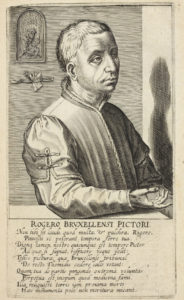
17. Rogier Van Der Weyden
May your praise not be that you painted many beautiful things, as your age could bear them (although they are worthy that anyone who is a painter in our time wish greatly to look at them, if he be wise – the paintings which forbid the tribunal of Brussels to leave the straight path of Justice are witness [to this]): but rather that your last will is a perpetual remedy for the hunger of the poor from the proceeds of your painting. The former, [itself] already near to death, you left on earth; the latter shines in the sky, as a monument that will not die. Continue Reading 17. Rogier Van Der Weyden
View →
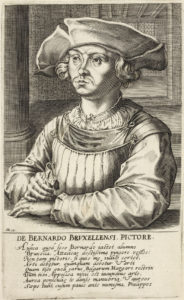
19. Bernaert Van Orley
That the Court of Brussels boasts of its nursling Bernaert, most skilled in painting Attalian garments, is not so much due (if anyone wants to argue while I am judging) to the painter’s skill (although it is also due to his skill) as it is to [the fact] that he was dear to you, Margaret ruler of the Belgians, since nothing is more delightful to you than the art of Apelles. By your gift, he often got golden handles for his paintbrushes, and gold coins, in recently minted currency. Continue Reading 19. Bernaert Van Orley
View →
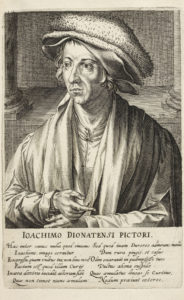
21. Joachim Patinir
That, amongst all of these, no image expressed with more liveliness than your face is to be seen, Joachim, has happened not only because Curtius’ hand cut it into the bronze ([the hand] which does not now fear another rival), but [also] because Dürer, admiring your hand, when you painted fields and huts, once drew your face on a palimpsest with his bronze point. Imitating those lines, Curtius surpassed himself, not to mention all the others. Continue Reading 21. Joachim Patinir
View →











